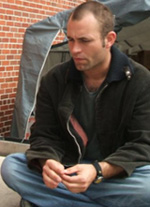Texas activist involved in New Orleans projects admits to being an FBI informant
 Activists and organizers in Texas and Louisiana were given a shock this past week when well-know Austin, Tex. activist Brandon Darby admitted in an open letter that he has been working as an informant for the Federal Bureau of Investigation.
Activists and organizers in Texas and Louisiana were given a shock this past week when well-know Austin, Tex. activist Brandon Darby admitted in an open letter that he has been working as an informant for the Federal Bureau of Investigation.Darby worked with anti-war and social justice groups throughout Houston and Texas and became well-known for his work in post-Katrina New Orleans as a co-founder and community organizer with Common Ground Relief, a grassroots volunteer organization founded in New Orleans in the aftermath of Hurricane Katrina that has brought thousands of volunteers to the region to support relief and rebuilding efforts. Darby was a visible member of the group, sometimes acting as a spokesman and appearing in campaign videos.
The New York Times reports that when a scheduled federal trial begins this month for two Texas men who were arrested during the Republican National Convention in St. Paul, Mn. last year on charges of making and possessing Molotov cocktails, one of the major witnesses against them will be Darby. In Darby's letter to fellow activists posted on Indymedia.org, Darby acknowledged that he has worked as an FBI informant, most recently at last year's RNC, providing information leading to the arrest and felony indictment of two Austin men who participated in the RNC protests -- David McKay and Bradley Crowder, now known as the "Texas Two." The two indicated men are scheduled to go on trial in Minnesota on Jan. 26, and if convicted on all counts, each faces a prison sentence of up to 30 years.
"The simple truth is that I have chosen to work with the Federal Bureau of Investigation," Darby wrote in the letter, adding that "I strongly stand behind my choices in this matter."
According to the Texas Observer:
Documents that activists said were given to defense lawyers by the prosecution and printed on F.B.I. letterhead indicated that an informant -- now identified as Mr. Darby -- carried out a thorough surveillance operation that dated back to at least 18 months before the Republican gathering. He first met Mr. Crowder and Mr. McKay in Austin six months before the convention.The New York Times reports that Darby would not provide details about his other undercover activities, but said he had also worked as an informant in cases not involving the convention. The Texas Observer reports that information gathered by Darby may have contributed to broader charges against eight others from around the country for conspiracy to riot and conspiracy to damage property in the furtherance of terrorism.
Mr. Darby provided descriptions of meetings with the defendants and dozens of other people in Austin, Minneapolis and St. Paul. He wore recording devices at times, including a transmitter embedded in his belt during the convention. He also went to Minnesota with Mr. Crowder four months before the Republican gathering and gave detailed narratives to law enforcement authorities of several meetings they had with activists from New York, San Francisco, Montana and other places.
The F.B.I. reports mentioned dozens of people, most of whom have not been accused of any crime. In addition to listing biographical and physical particulars, Mr. Darby frequently offered observations on the motives, attitudes and states of mind of activists with whom he dealt.
Some former friends of Mr. Darby have denounced him as a provocateur and said he might have enabled or encouraged Mr. Crowder and Mr. McKay to break the law.
Over the years Brandon Darby has established strong ties withindividuals in many different radical communities across the UnitedStates. Darby's revelations caused shock and indignation in the activistcommunity, with people in various groups and causes accusing him ofbetrayal.
"While it is not yet clear how long or to whatextent Darby has been acting as an informant, the emerging truth aboutDarby's malicious involvement in our communities is heart-breaking andutterly ground-shattering to some of us who were closest to him," saysScott Crow, who in 2005 co-founded Common Ground Relief with Darby.
In a public letter, the Austin Informant Working Group, a collection of activists from the city who worked with Darby went on to say:
Through the history of our struggles for a better world, infiltrators and informants have acted as tools for the forces of misery in disrupting and derailing our movements. However, even more dangerous to our communities than setting people up, turning them in, or gathering information, informants sow seeds of fear, paranoia, and distrust that fester and grow in paralyzing and destructive ways. We must be forever vigilante against deceptive, malicious and manipulative actors, while we defend the trust and openness that give our communities cohesion and power.
